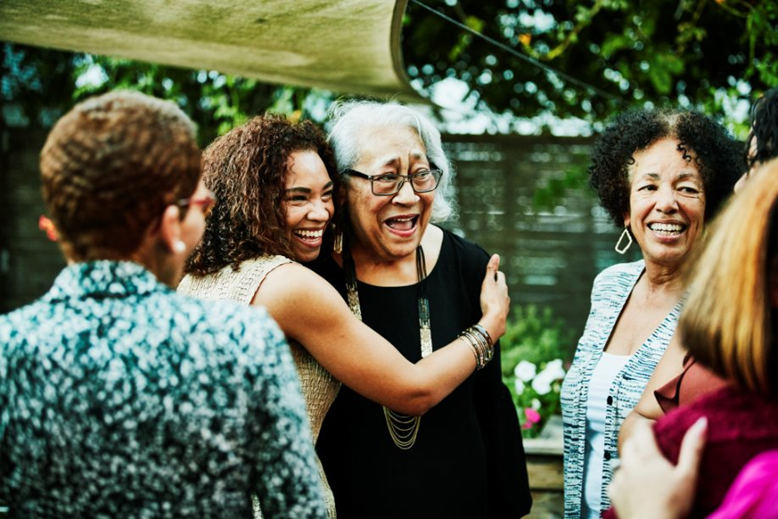Friendship is one of the most important aspects of life. It brings joy and meaning to our daily lives, but it also has a profound impact on our well-being. Faith, hope, and love are core values that together form the foundation of a strong friendship. As Samuli Edelmann once said, (nosto) a friend’s love is the purest and most understandable form of love – it is trust, loyalty, and the willingness to share one’s time with another.
But friendship is not just a pleasant addition to life – it is also a cornerstone of health. Studies show that strong social relationships positively affect both physical and mental well-being. Why is this the case, and what does science say about the power of friendship?

Sometimes in Our Lives, We All Have Pain – The Effects of Loneliness on Health
Loneliness and social isolation pose major health risks. Reseach had found that a lack of social connections increases the risk of illness, shortens life expectancy, and raises the likelihood of dementia, which demonstrates that loneliness negatively affects health (Umberson & Donnelly, 2023).
Loneliness is a greater risk factor for premature death than climate change or obesity (Junttila, 2015, 35). Junttila was involved in a study (Saari et al., 2020) in which one in four respondents stated they would be willing to lower their standard of living if it meant gaining even one friend. The next step for him and other loneliness researchers is to make everyone aware of the phenomenon – No one can change the situation alone, but everyone can do something. Loneliness is a subjective experience. A person can feel lonely even in a large crowd, while someone who spends a lot of time alone may not necessarily feel lonely. Being alone is a physical state; loneliness is psychological. Junttila (2015,15) describes social loneliness, where a person lacks a group of their own, and emotional loneliness, where a person has no close friend for support.
Lean on Me When You’re Not Strong – The Impact of Friendship on Physical and Mental Well-being
Research shows that strong social networks not only support psychological and emotional well-being but can also extend lifespan. Positive relationships protect against heart disease, strokes, and depression, and they have also been linked to lower mortality rates. In communities known for longevity and good health, such as Okinawa, Sardinia, and Ikaria, social connectedness and strong friendships play a crucial role. People in these regions tend to live longer and healthier lives, enriched by close social bonds, a strong sense of community, and an active lifestyle. (Buettner, 2024).
In Finland, the annual cost of treating memory-related diseases is nearly one billion euros, making prevention a significant public health goal. The World Health Organization (WHO) has identified social cohesion as a key factor in preventing memory disorders (THL, 2023). Supporting social inclusion and community engagement throughout life can play an essential role in maintaining overall health.
Furthermore, friendships have been shown to reduce the risk of mental health issues. Studies indicate that strong and supportive relationships can help prevent depression, anxiety, loneliness, and substance abuse. People with reliable friends and positive social experiences tend to experience greater happiness and well-being in their daily lives (Pezirkianidis, Galanaki, Raftopoulou, Moraitou & Stalikas, 2023). This highlights the importance of social relationships not only for individual well-being but also on a broader societal level.
For It Won’t Be Long ‘Til I’m Gonna Need Somebody to Lean On – One Conversation Can Work Wonders
A study by Hall, J. A. & co (2023) shows that even a single meaningful conversation with a friend can improve well-being. According to the Communicate Bond Belong theory, the need for belonging is fundamental to humans, and social interactions strengthen this feeling. Even a brief chat—such as exchanging updates or sharing a joke with a friend—can reduce stress and increase happiness. (Hall, J. A. & co., 2023.)
Participants of the Hall & co research who connected with their friends during the day reported feeling better than those who did not communicate at all. We can enhance our well-being simply by making time for our friends. As Hall (2023) states, our emotions and moods are shaped by how we interact with others.
Call Me If You Need a Friend – The Impact of Social Media on Friendship
Social media has revolutionized the way we maintain friendships. On one hand, it offers new opportunities for staying connected, but on the other, it can also increase loneliness and distort our perception of relationships. Many people compare their own lives to the carefully selected “perfect” moments shared on social media, which can lead to feelings of inadequacy.
While social media provides a way to stay in touch, true friendships are built on honesty and face-to-face interactions. Friendship doesn’t require perfect pictures or constant online presence—it requires trust, time, and genuine care.
It is worth putting value on social relationships because of health and wellbeing. Power is in friendship.
As Bill Withers sings in Lean on Me: “I’m right up the road, I’ll share your load, if you just call me.”
Real friendship is never far away—it’s always there when you need it.

Writers:
Heinonen, Jenni, Eho Tiia and Mäkelä, Soile. Students of Welfare and Health Coordinator Master`s Degree Program at Savonia University of Applied Sciences.
Pehkonen Pirjo, Peteri Juha and Savela Sanna. Lecturers at Savonia University of Applied Sciences.
Sources:
Buettner, D. (2024, lokakuu). Dan Buettner shares the secrets to longevity. Parks & Recreation. National Recreation and Park Association. https://www.nrpa.org/parks-recreation-magazine/2024/october/dan-buettner-shares-the-secrets-to-longevity/?utm_source=chatgpt.com
Edelmann, S. (2025, maaliskuu 13). Rakastuminen on aivojen häiriötila. Kotiliesi. https://kotiliesi.fi/ihmiset-ja-ilmiot/samuli-edelmann-rakastuminen-on-aivojen-hairiotila/
Hall, J. A., Holmstrom, A. J., Pennington, N., Perrault, E. K., & Totzkay, D. (2023). Quality Conversation Can Increase Daily Well-Being. Sage Journals. Communication Research, 0(0). Viitattu 9.2.2025. Saatavissa: https://doi.org/10.1177/00936502221139363
Junttila, N. (2015). Kavereita nolla: Lasten ja nuorten yksinäisyys. Tammi.
Mielenterveys on osa hyvinvointia ja terveyttä. 2021. Mieli ry. Viitattu 2.2.2025. Saatavissa: https://mieli.fi/vahvista-mielenterveyttasi/mita-mielenterveys-on/mielenterveys-on-osa-hyvinvointia-ja-terveytta/
Muistisairaudet. 2023. THL. Viitattu 1.2.2025. Saatavissa: https://thl.fi/aiheet/kansantaudit/muistisairaudet
Pezirkianidis, C., Galanaki, E., Raftopoulou, G., Moraitou, D. & Stalikas, A. 2023. Volume 14. Adult friendship and wellbeing: A systematic review with practical implications. Viitattu 9.2.2025. Saatavissa: https://doi.org/10.3389/fpsyg.2023.1059057
Saari, J., Helsingin Sanomat, Kauhanen, J., Karhunen, L., Lagus, K., Kainulainen, S., Pantzar, M., Erola, J., Junttila, N., Müller, K., & Huhta, J. (2020). Helsingin Sanomien yksinäisyyskysely 2014 (Dataversio 1.0) [Data-aineisto]. Yhteiskuntatieteellinen tietoarkisto. Viitattu 3.4.2025. Saatavissa: https://doi.org/10.60686/t-fsd3360
Umberson, D. & Donnelly, R. 2023. Social Isolation: An Unequally Distributed Health Hazard. Annual Review of Sociology Volume 49. Viitattu 30.2.2025. Saatavissa: https://doi.org/10.1146/annurev-soc-031021-012001
